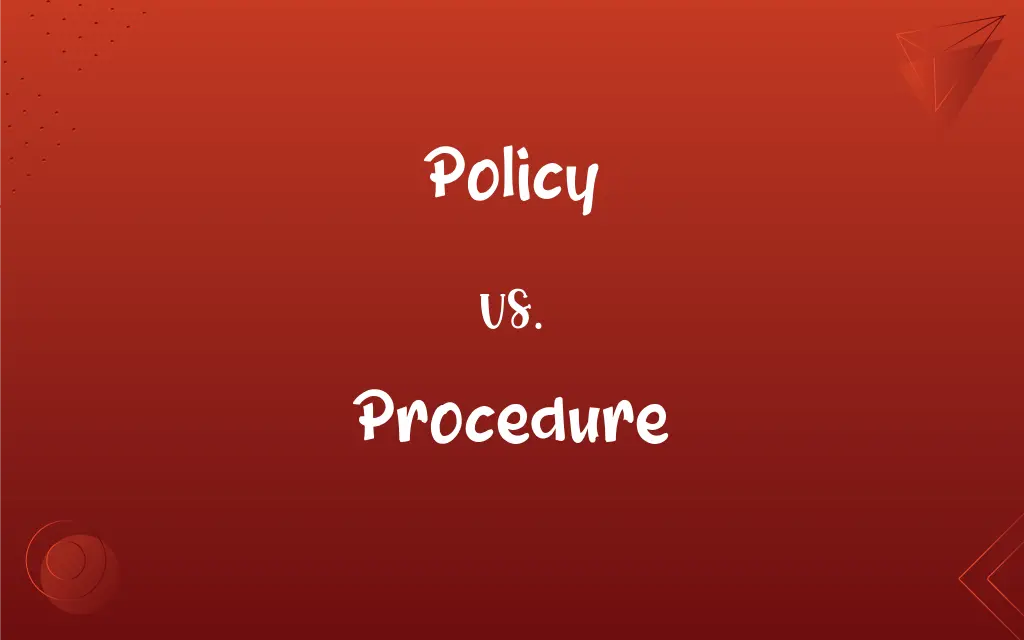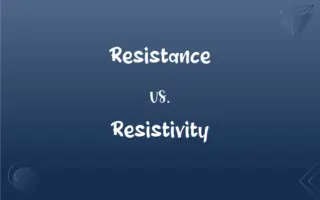Policy vs. Procedure: What's the Difference?
Edited by Janet White || By Harlon Moss || Updated on October 25, 2023
A policy is a guideline or set of principles, while a procedure is a series of steps to achieve a certain goal.

Key Differences
Policy and procedure are integral components of any organization or system. A policy is a predetermined course of action that sets clear benchmarks for decision-making. It provides a framework within which decisions can be made consistently and fairly. On the other hand, a procedure details the specific actions required to achieve a certain outcome or to implement a particular policy.
Policies are broad and give an overall intention or direction for an organization. They answer the "what" and "why" questions. For instance, a company might have a policy against discrimination. Procedures, however, are the "how" of the equation. If a company has a policy against discrimination, the procedure would detail the steps for reporting and addressing such incidents.
A policy can be seen as a guiding light, offering direction and ensuring that everyone is on the same page. It’s less about the details and more about the intent or overarching goals. Conversely, a procedure is a roadmap, a clear and detailed plan on how to get from Point A to Point B. It’s the operational aspect of how a policy will be carried out.
In essence, while policies provide a foundation and guide the overall direction of an organization, procedures offer a clear and concise series of actions to ensure that the policies are correctly and consistently implemented. Without a policy, a procedure might lack context or purpose. And without a procedure, a policy may remain an abstract concept without clear execution.
Comparison Chart
Definition
A guideline or set of principles.
A series of steps to achieve a certain goal.
ADVERTISEMENT
Focus
"What" and "Why".
"How".
Nature
Broad and overarching.
Detailed and specific.
Purpose
To provide direction and set intentions.
To implement policies and achieve results.
Dependency
Can exist without procedures but may lack execution.
Often based on policies to provide context.
Policy and Procedure Definitions
Policy
A course of action adopted by an organization or individual.
The company has a policy of promoting from within.
ADVERTISEMENT
Procedure
A method of performing a task.
What's the procedure for applying for a visa?
Policy
A principle of behavior.
Honesty is a good policy in all situations.
Procedure
A surgical intervention.
The patient underwent a minor procedure on his knee.
Policy
A contract of insurance.
She just renewed her car insurance policy.
Procedure
An established or accepted way of doing something.
The procedure for electing a new chairperson is outlined in the bylaws.
Policy
A strategy or tactic.
The government's foreign policy is under scrutiny.
Procedure
A series of actions conducted in a certain order.
The emergency evacuation procedure was practiced monthly.
Policy
A written commitment or guarantee.
The store's return policy is very generous.
Procedure
A set of instructions.
Please follow the procedure in the manual to assemble the furniture.
Policy
A plan or course of action, as of a government, political party, or business, intended to influence and determine decisions, actions, and other matters
American foreign policy.
The company's personnel policy.
Procedure
A manner of proceeding; a way of performing or effecting something
Standard procedure.
FAQs
What is a policy?
A policy is a guideline or set of principles guiding decision-making.
How is a procedure defined?
A procedure is a series of actions taken to achieve a specific goal.
Can a policy exist without a procedure?
Yes, but it might lack clear execution without a related procedure.
Can policies conflict with each other?
Ideally, no. But if they do, it's a sign they need review and clarification.
How do you ensure everyone follows a procedure?
Training, communication, and periodic audits or reviews can help.
Is a policy legally binding?
Not always, but some policies, especially in formal contracts or governmental settings, can have legal implications.
Are all procedures written down?
Ideally, yes, to ensure clarity and consistency, but some might be informally understood.
Do all organizations need formal policies and procedures?
While beneficial for clarity and consistency, the need varies based on the organization's size and nature.
Who should be informed when a new policy or procedure is introduced?
All relevant stakeholders, especially those directly affected.
Why is it important to differentiate between policy and procedure?
Understanding the distinction ensures clarity in direction and execution within an organization.
Who usually sets policies in an organization?
Top management or governing bodies typically set policies.
How often should policies and procedures be reviewed?
Regularly, to ensure they remain relevant and effective.
Why do companies need policies?
They provide direction, set standards, and ensure consistency in decision-making.
What's the relationship between policy and procedure?
Policies provide the intention and direction, while procedures detail the steps for execution.
Who is responsible for creating procedures?
Procedures are often developed by middle management or specific departments.
Can a procedure stand alone without a policy?
While it's possible, a procedure without a policy might lack context or purpose.
Is a company's refund policy the same as a procedure?
The refund policy states the intention or conditions for refunds, while the procedure would detail how to process them.
Why are procedures important?
They provide a clear path for implementing policies and ensuring consistency.
Can procedures change?
Yes, procedures can evolve based on new information or changing circumstances.
How specific should a procedure be?
It should be detailed enough to provide clear steps but flexible enough for situational judgment.
About Author
Written by
Harlon MossHarlon is a seasoned quality moderator and accomplished content writer for Difference Wiki. An alumnus of the prestigious University of California, he earned his degree in Computer Science. Leveraging his academic background, Harlon brings a meticulous and informed perspective to his work, ensuring content accuracy and excellence.
Edited by
Janet WhiteJanet White has been an esteemed writer and blogger for Difference Wiki. Holding a Master's degree in Science and Medical Journalism from the prestigious Boston University, she has consistently demonstrated her expertise and passion for her field. When she's not immersed in her work, Janet relishes her time exercising, delving into a good book, and cherishing moments with friends and family.































































